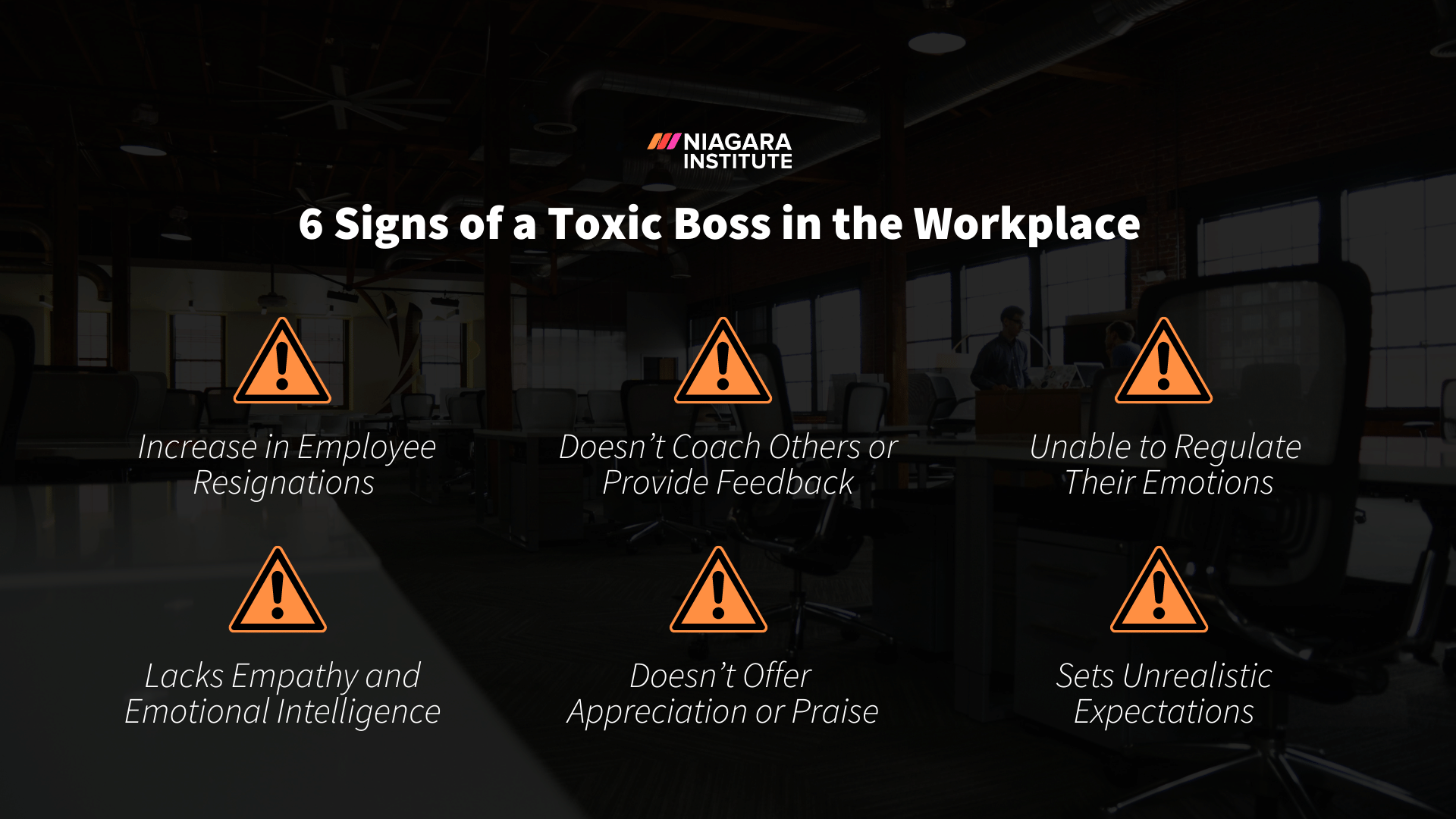7 min read
Is Your Team Unhappy? Build a Better Work Environment!
A happy and engaged team is the backbone of any successful organization.
4 min read
 Michelle Bennett
:
Jan 17, 2023 5:00:00 AM
Michelle Bennett
:
Jan 17, 2023 5:00:00 AM

No one in leadership is perfect. Leaders are flawed and as prone to mistakes as anyone else in the workplace.
However, sometimes it's bigger than that. Rather than making an occasional mistake or bad judgment call, some bosses display a pattern of bad behavior that causes widespread repercussions for employees, fellow leaders, and even customers. This is the difference between a typical boss and a toxic manager or boss.
If you’re here reading this article, you likely suspect that one of the leaders you oversee is exhibiting the signs of a toxic boss and want to determine if you do in fact, have justified reason to be concerned or to take corrective action.
To help you get there, read through the following list of 6 signs that are commonly indicative of a toxic boss and as you do, contemplate if the leader in question is displaying more than one of those signs and what you can do to address the problem if one does exist.

One cause to suspect a toxic boss is when the people working for them begin to quit unexpectedly or en-mass. For example, a recent study of over 2,0000 employees in the UK found that more than 2 in 5 employees have left a job because of a bad or toxic boss who failed to listen, was seen as ‘unapproachable,’ treated members of the team differently, or yelled at the team. This is to say that if you have seen a recent uptick in questionable resignations, it’s important to dive deeper into the potential reasons why, such as leadership.
Despite the fact that today’s workforce craves in-the-moment coaching and constructive feedback, some toxic bosses will neglect or refuse this crucial part of the leadership role. Not only does this create a culture of fear and anxiety regarding one’s performance, but it can also crush an employee’s empowerment and motivation, as well as stagnate their learning and growth.
Employees shouldn’t feel as though they are walking on eggshells around their boss, worried about whether they will be warm one day and then spiteful or angry the next. But, unfortunately, if a leader cannot regulate their emotions, this is the experience that employees of that person will have to endure day-in and day-out.
According to research conducted by psychologists, “high-power individuals (ex. leaders) tend to be less sensitive to the emotions of others, less willing to consider others’ perspectives, and less able to accurately infer others’ emotions.” This is concerning, given that emotional intelligence and empathy in leadership are linked to increased innovation, retention, inclusion, and engagement.
When an employee works overtime, does their boss express their appreciation? When the team achieves a significant milestone, is that success celebrated by their boss? Does the leader say, “Good job, team?” You might be dealing with a toxic boss if the answer is no.
At this point, ask yourself whether or not that leader withholds praise and appreciation intentionally. In this case, that is a far more nefarious and concerning situation than a leader who is unintentionally doing so because they aren’t comfortable expressing gratitude in the workplace but could learn to do so.
A tell-tale sign of a toxic boss is someone who sets unrealistic expectations for their employees. Whether they expect their employee to meet an impossibly high standard or unreasonable deadline, you’ll notice something is amiss when employees begin to burn out, disengage, and even leave the company. This can often be tied to coercive power, where the leader imposes unreasonable demands to maintain control and authority.
Assess the situation and identify toxic behavior. This can include micromanaging, bullying, lack of appreciation, unrealistic expectations, or poor communication.
You may need to build an empathy to understand what specific behaviors or actions make your boss toxic. Sometimes, toxic behavior can stem from insecurity, fear of failure, emotional instability, poor interpersonal skills, etc.
You may also need to keep a record of specific instances of toxic behavior. Document dates, times, and details of each incident. This can be useful if you need to report the behavior later.
Give Them Direct Feedback
Sometimes, people are unaware of their own behavior. For this reason, to build a better relationship with your boss, it’d be best to provide feedback. This may not only improve your relationship with your boss but also benefit the whole team, as they may adopt more mindful leadership practices based on your input.
Frame a constructive feedback by focusing on specific behaviors and their impact on your work. By observing their reactions, you may understand whether their leadership skills differ from what you've always seen, or if they are simply toxic.
Effective communication is key when dealing with a toxic boss. Maintain professionalism in your interactions with your boss.
Avoid reacting emotionally, even when you feel provoked. If possible, ask for clear instructions and expectations from your boss to minimize misunderstandings. Use "I" statements to express how certain behaviors affect you, for example, "I feel overwhelmed when deadlines are changed at the last minute."
It's essential to protect your personal time and mental health when dealing with a toxic boss. Set clear boundaries to ensure work stress does not invade your personal life. Seek support from trusted colleagues as their backing can help you cope with toxic boss and the stress he causes.
Setting and enforcing boundaries is crucial when dealing with a toxic boss, and it's a fundamental aspect of standing up for yourself at work. It’s important to define what is acceptable in terms of work hours, communication, and responsibilities.
Clearly communicate your boundaries to your boss, specifying when you are available for work and when you are not. For instance, if after-hours calls are affecting your personal life, you might say, “I am available for calls and emails until 6 PM; after that, I will respond the next business day.” Enforcing these boundaries firmly and consistently helps establish respect and limits that protect your personal space and mental health.
Unfortunately, toxic bosses are far more common than we might believe. According to McKinsey, 56% of workers in the United States claim that their boss is mildly or highly toxic, while 75% say that their boss is the most stressful part of their workday. If this doesn’t concern you, then it should.
Fortunately, if you oversee a team of managers, supervisors, and leaders, you can do something about it.
For example, many in leadership do not receive the proper training and coaching needed to be healthy and effective leaders. In place of that formal leadership training, they may take cues from and mimic their past leaders, even if those leaders weren’t positive role models. Therefore, one way to prevent leaders, especially up-and-coming first-time leaders, from turning into toxic bosses is to provide them with training and coaching that sets a strong example of effective leadership and equips them with practical tools they can use in their day-to-day life.

7 min read
A happy and engaged team is the backbone of any successful organization.

8 min read
With a team of unique individuals with different personalities, experiences, and preferences, it is hard to know what your direct reports want and...

8 min read
Leaders wear many hats. From inspiring your employees during a team meeting to proving motivation and encouragement in challenging times and ...